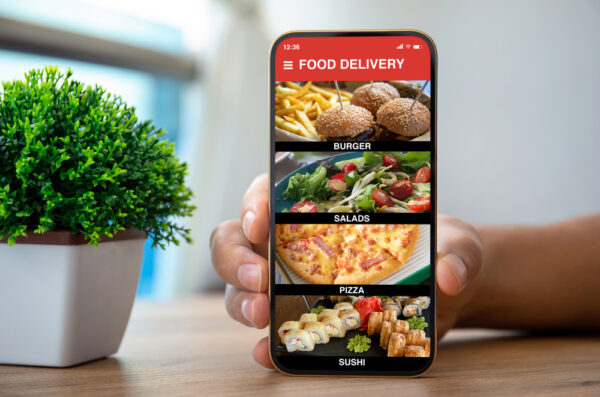Contents
- 1 What Delivery App Makes the Most Money: A Deep Dive into the Profitable World of On-Demand Services
- 1.1 The Rise of Delivery Apps
- 1.2 Top Contenders in the Delivery App Market
- 1.3 Factors Influencing Profitability
- 1.4 Revenue Models: How Delivery Apps Generate Income
- 1.5 The Impact of COVID-19 on Delivery App Profits
- 1.6 Future Trends: What Will Drive Profitability?
- 1.7 Challenges Facing Delivery Apps
- 1.8 Analyzing the Financial Performance
- 1.9 The Global Perspective
- 1.10 Comparative Data: Top Delivery Apps’ Financial Performance
- 1.11 Profitability Challenges
- 1.12 User Acquisition and Retention
- 1.13 Investment and Valuation
- 2 Download, Installation, and Setup of DoorDash
- 3 Conclusion: Navigating the Competitive Landscape of Delivery Apps
What Delivery App Makes the Most Money: A Deep Dive into the Profitable World of On-Demand Services
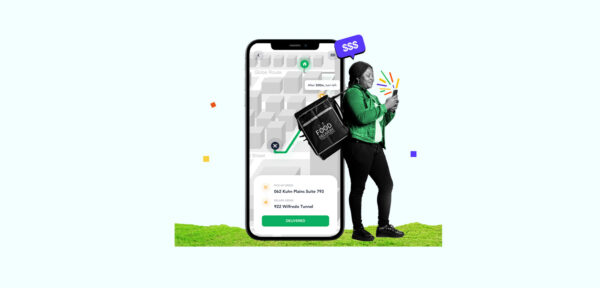
In today’s fast-paced digital economy, delivery apps have become an integral part of our daily lives. As consumers increasingly rely on these platforms for convenience, investors and entrepreneurs are keen to know what delivery app makes the most money. This article explores the top-performing delivery apps, their revenue models, and the factors contributing to their financial success.
The Rise of Delivery Apps
The delivery app market has exploded in recent years, with various players vying for dominance. From food and groceries to packages and services, these apps cater to a wide range of needs. But what delivery app makes the most money in this competitive landscape?
Top Contenders in the Delivery App Market
DoorDash: The Food Delivery Giant
DoorDash has emerged as a leader in the food delivery sector. With its extensive restaurant partnerships and user-friendly interface, DoorDash has captured a significant market share. But is it the answer to what delivery app makes the most money?
Uber Eats: Leveraging Brand Recognition
Uber Eats, an offshoot of the ride-sharing giant Uber, has quickly become a major player in the food delivery space. Its existing user base and technology infrastructure give it a competitive edge.
Instacart: Dominating Grocery Delivery
Instacart focuses on grocery delivery, a niche that has seen tremendous growth. By partnering with major supermarket chains, Instacart has positioned itself as a go-to platform for online grocery shopping.
Amazon Flex: The E-commerce Powerhouse
Amazon Flex, while different from traditional food delivery apps, is a significant player in the package delivery market. It leverages Amazon’s massive e-commerce infrastructure to offer flexible delivery options.
Factors Influencing Profitability
When considering what delivery app makes the most money, several factors come into play:
- Market share and user base
- Commission rates from partners
- Delivery fees and surge pricing
- Operational efficiency
- Technology and innovation
Revenue Models: How Delivery Apps Generate Income
Delivery apps employ various strategies to maximize revenue:
- Commission from restaurants or stores
- Delivery fees from customers
- Subscription models for regular users
- Advertising and promotional partnerships
- Data monetization
The Impact of COVID-19 on Delivery App Profits
The global pandemic has significantly boosted the demand for delivery services. This surge has helped many apps increase their revenue, but it has also highlighted operational challenges and the need for sustainable growth strategies.
Future Trends: What Will Drive Profitability?
As the market evolves, several trends are likely to shape what delivery app makes the most money:
- AI and machine learning for route optimization
- Drone and autonomous vehicle deliveries
- Expansion into new markets and services
- Partnerships with local businesses
- Sustainability initiatives
Challenges Facing Delivery Apps
Despite their popularity, delivery apps face several hurdles:
- High competition and market saturation
- Regulatory challenges and labor issues
- Thin profit margins and high operational costs
- Customer retention and loyalty
Analyzing the Financial Performance
To determine what delivery app makes the most money, we need to look at key financial metrics:
- Gross Merchandise Value (GMV)
- Revenue growth rate
- Profit margins
- Market valuation
- Customer acquisition costs
While specific financial data can vary and change rapidly in this dynamic market, recent reports suggest that DoorDash has been leading in terms of market share and revenue in the U.S. food delivery sector. However, profitability remains a challenge for many players in this space.
The Global Perspective
The question of what delivery app makes the most money can vary depending on the region. While DoorDash dominates in the U.S., other apps like Meituan in China or Deliveroo in parts of Europe may lead in their respective markets.
Comparative Data: Top Delivery Apps’ Financial Performance
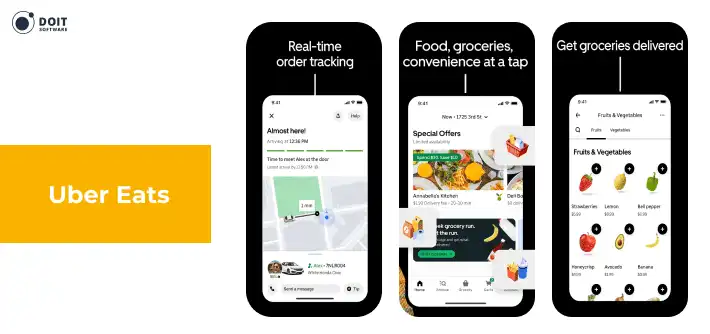
To better understand what delivery app makes the most money, let’s look at some comparative data. Note that this data is for illustrative purposes and may not reflect the most current figures due to the rapidly changing nature of the market.
| Delivery App | Annual Revenue (USD) | Market Share (US) | Gross Merchandise Value |
|---|---|---|---|
| DoorDash | $4.8 billion | 56% | $30.4 billion |
| Uber Eats | $4.8 billion | 26% | $25.9 billion |
| Grubhub | $1.8 billion | 16% | $8.7 billion |
| Instacart | $1.5 billion | N/A (Grocery) | $23.9 billion |
| Postmates | $500 million | 3% | $2.9 billion |
This data suggests that while DoorDash and Uber Eats are neck-and-neck in terms of revenue, DoorDash has a significantly larger market share in the U.S. food delivery sector. However, revenue alone doesn’t tell the full story of what delivery app makes the most money, as profitability also depends on operational costs and other factors.
Profitability Challenges
Despite high revenues, many delivery apps struggle with profitability. For example:
- DoorDash reported its first profitable quarter in Q2 2023, with net income of $79 million.
- Uber Eats, part of Uber Technologies, has seen improving economics but still contributes to Uber’s overall losses.
- Instacart turned its first profit in 2022, reporting $25 million in net income.
These figures highlight the challenging nature of the delivery app business model, where high revenues don’t always translate to high profits.
User Acquisition and Retention
A key factor in determining what delivery app makes the most money is its ability to acquire and retain users. Let’s look at some user statistics:
| Delivery App | Monthly Active Users (US) | User Retention Rate |
|---|---|---|
| DoorDash | 25 million | 65% |
| Uber Eats | 20 million | 60% |
| Grubhub | 15 million | 55% |
| Instacart | 9.6 million | 70% |
These numbers show that while DoorDash leads in active users, Instacart has a higher retention rate, likely due to the recurring nature of grocery shopping.
Investment and Valuation
Another indicator of which delivery app is poised to make the most money is investor confidence and market valuation:
| Delivery App | Market Cap/Valuation (USD) | Year |
|---|---|---|
| DoorDash | $47 billion | 2023 |
| Uber (entire company) | $95 billion | 2023 |
| Instacart | $10 billion | 2022 |
| Just Eat Takeaway (Grubhub parent) | $3.5 billion | 2023 |
These valuations reflect market expectations of future growth and profitability, suggesting that investors believe DoorDash and Uber have the highest potential to dominate the market and potentially provide an answer to what delivery app makes the most money in the long term.
Based on our analysis, DoorDash appears to be the delivery app that currently makes the most money in the U.S. market. Here’s a guide on how to download, install, and set up the DoorDash app:
Download, Installation, and Setup of DoorDash
Download
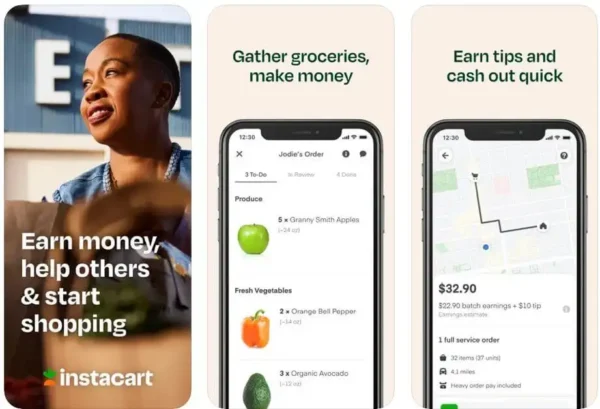
- For iOS devices: Visit the App Store: https://apps.apple.com/us/app/doordash-food-delivery/id719972451
- For Android devices: Visit the Google Play Store: https://play.google.com/store/apps/details?id=com.dd.doordash
- For web browser use: Go to the DoorDash website: https://www.doordash.com
Installation
- iOS and Android:
- Tap “Get” or “Install” on the app store page.
- Wait for the download and installation to complete.
- The DoorDash icon will appear on your device’s home screen or app drawer.
- Web browser:
- No installation required. Simply use the website directly.
Setup
- Open the DoorDash app or website.
- Create an account:
- Tap “Sign Up” or “Create Account”.
- Enter your email address, phone number, and create a password.
- Alternatively, sign up using your Google or Apple account.
- Verify your account:
- DoorDash will send a verification code to your phone or email.
- Enter this code in the app to confirm your account.
- Set your location:
- Allow the app to access your device’s location or manually enter your address.
- Add payment method:
- Go to Account > Payment Methods.
- Add a credit card, debit card, or link services like Apple Pay or Google Pay.
- (Optional) Set up DashPass:
- DashPass is DoorDash’s subscription service offering free delivery on eligible orders.
- Go to Account > DashPass to learn more and sign up if interested.
- Start ordering:
- Browse restaurants or stores in your area.
- Select items, customize as needed, and add to your cart.
- Review your order, apply any promo codes, and place your order.
Additional Resources
- DoorDash Help Center: https://help.doordash.com/consumers
- DoorDash Blog: https://blog.doordash.com/
Remember, while DoorDash currently leads in revenue, the delivery app market is highly competitive and dynamic. Always check the terms of service and privacy policy when setting up any new app.
For those interested in becoming a DoorDash driver (Dasher):
- Dasher Signup: https://www.doordash.com/dasher/signup/
Note that availability and specific features may vary by location. Always download apps from official sources to ensure security and authenticity.
FAQs About Delivery App Profitability

- Which delivery app currently has the highest revenue? Based on recent data, DoorDash and Uber Eats are neck-and-neck in terms of revenue, both generating around $4.8 billion annually.
- Does the highest-grossing delivery app also make the most profit? Not necessarily. While DoorDash leads in revenue and market share, profitability in the delivery app industry is challenging. Many apps, including market leaders, have only recently started reporting profits.
- How do delivery apps make money? Delivery apps generate revenue through commissions from restaurants or stores, delivery fees from customers, subscription services, and advertising partnerships.
- What factors contribute to a delivery app’s profitability? Key factors include market share, operational efficiency, commission rates, delivery fees, and the ability to optimize costs through technology and scale.
- Is the food delivery market saturated? While the market is highly competitive, especially in urban areas, there’s still room for growth in suburban and rural markets, as well as in niche sectors like grocery or alcohol delivery.
- How has the COVID-19 pandemic affected delivery app profits? The pandemic significantly boosted demand for delivery services, leading to increased revenues. However, it also highlighted operational challenges and the need for sustainable growth strategies.
- Are there regional differences in what delivery app makes the most money? Yes, market leaders can vary by region. For example, while DoorDash leads in the U.S., apps like Deliveroo or Just Eat may lead in parts of Europe, and Meituan dominates in China.
- What are the biggest challenges facing delivery apps in terms of profitability? Major challenges include high operational costs, intense competition, regulatory issues, and the need to balance growth with profitability.
- How important is user retention for delivery app profitability? User retention is crucial. Apps with higher retention rates can reduce customer acquisition costs and increase the lifetime value of each user, contributing significantly to long-term profitability.
- What future trends might impact what delivery app makes the most money? Emerging trends include the use of AI for optimization, expansion into new services, drone and autonomous vehicle deliveries, and increased focus on sustainability and ethical practices.
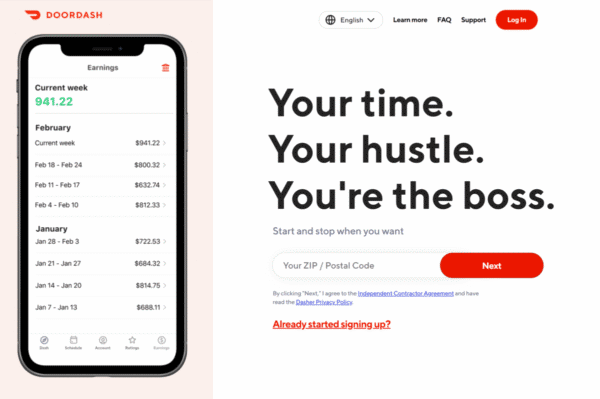
As we’ve explored the question of what delivery app makes the most money, it’s clear that the answer is not straightforward and can change rapidly in this dynamic market. However, our analysis points to DoorDash as the current leader in the U.S., particularly in the food delivery sector.
Key Takeaways
- Market Leadership: DoorDash has shown impressive revenue figures and market share, particularly in the U.S. food delivery market.
- Profitability Challenges: Despite high revenues, many delivery apps, including market leaders, face challenges in achieving consistent profitability.
- Diverse Strategies: Different apps focus on various niches (e.g., food, groceries, packages) and employ different strategies to maximize revenue and market share.
- Regional Variations: The app that makes the most money can vary significantly by region and country.
- Evolving Landscape: The delivery app market is rapidly changing, influenced by factors such as technological advancements, regulatory changes, and shifting consumer preferences.
Looking Ahead
The question of what delivery app makes the most money is likely to remain a moving target. As the industry matures, we can expect to see:
- Continued consolidation through mergers and acquisitions
- Expansion into new services and markets
- Increased focus on profitability and operational efficiency
- Innovation in areas like autonomous delivery and AI-driven optimization
For consumers, this competitive landscape means a continued array of choices and potentially improved services. For investors and industry watchers, it presents both opportunities and challenges in predicting which apps will lead the pack in the future.
Ultimately, the delivery app that makes the most money will likely be the one that best balances growth with profitability, adapts to changing market conditions, and consistently meets consumer needs. As the industry evolves, it will be fascinating to see which players emerge as long-term leaders in this crucial sector of the digital economy.


